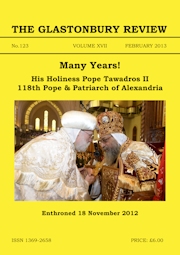TRUSTING IN PROVIDENCE
For Orthodox Christians the past year has been one of much upheaval and unrest. In our Oriental Orthodox family the death of the long-serving and influential Pope Shenouda III, followed a few months later by the sudden death of Abune Paulos, the Ethiopian Patriarch, removed two significant and pivotal figures. The passing of the highly respected Armenian Patriarch of Jerusalem, Torkom II (Manoogian), though not unexpected, nevertheless was deeply felt. Our Eastern Orthodox brothers also lost Ignatius IV (Hazim), Greek Orthodox Patriarch of Antioch for more than three decades.
These changes in spiritual leadership, coming at a time of political disruption and instability, give cause for anxiety. Despite the installation of President Mohammed Morsi, the Revolution in Egypt cannot be said to have run its course; whilst in Ethiopia the death of Meles Zenawi, controversial prime minister for the past seventeen years, leaves many problems unresolved. Syria, once a model of stability and religious pluralism, has descended into an abyss of barbarism threatening to drag the whole region down with it when it finally implodes; whilst Jerusalem is the holy city over which rival faiths bitterly contend.
The Church, faithful to her witness through all ages, has earnestly sought the Holy Spirit to provide new shepherds to lead their troubled flocks in the midst of all this confusion. For the Coptic Church the Lord has given us Pope Tawadros II, who in the first days of his ministry, emphasised the essentially spiritual nature of his office. As we go to press the Ethiopian Orthodox Church has chosen Archbishop Mathias of Jerusalem to be her new Patriarch. Born and educated in Tigray, he is clearly identified with the patriarchate of the popular Abune Tekla Haimanot, 3rd Patriarch of Ethiopia (1976-1988) and an outspoken opponent of the Derg. His time serving in America, first as an exile and later as Archbishop, has given him experience of the West, whilst his long absence from Ethiopia has kept him clear of internal secular and ecclesiastical squabbles. He is also believed to have made earnest attempts to reunite the rival Synod of the former Patriarch Merkorios. Both the Coptic and the Ethiopian elections involved a large electorate, including parish clergy and laity, which can only enhance the authority and appeal of those selected in this manner.
Significantly, the new Armenian Patriarch of Jerusalem, Nurhan (Manougian) is a native of Aleppo, whilst Patriarch John X (Yazigi) of Antioch was born in Latakia and was recently enthroned in a Damascus under siege. They will not be indifferent to the plight of the ancient Christian communities decimated by the Syrian chaos nor its significance for the entire region.
Inevitably, all their flocks will put their trust in these good men, although none of them has any significant political power to influence events, and each can only direct their faithful to trust in Divine Providence and pray for the mercy of God. The Apostle Paul, seeking Divine assistance in his infirmity, was assured that God’s grace is sufficient, for His strength is made perfect in weakness” (Corinthians XII: 9). Each of these new leaders, however, coming from a rich monastic tradition, understands the power of prayer and dependence on providence, and it is this spiritual authority rooted in the Faith which will enable them to be a blessing to their flocks and beacons of hope in the dark days ahead. We thank the loving-kindness of God for these new leaders of the Church and pray that He will sustain them in their ministries.

